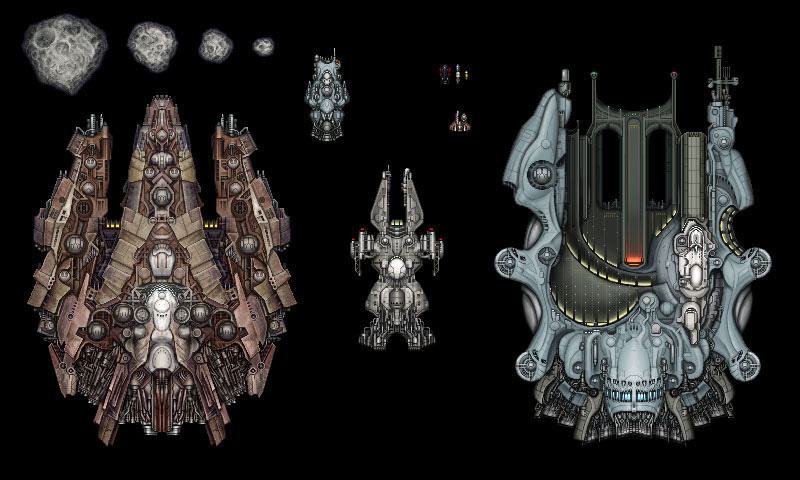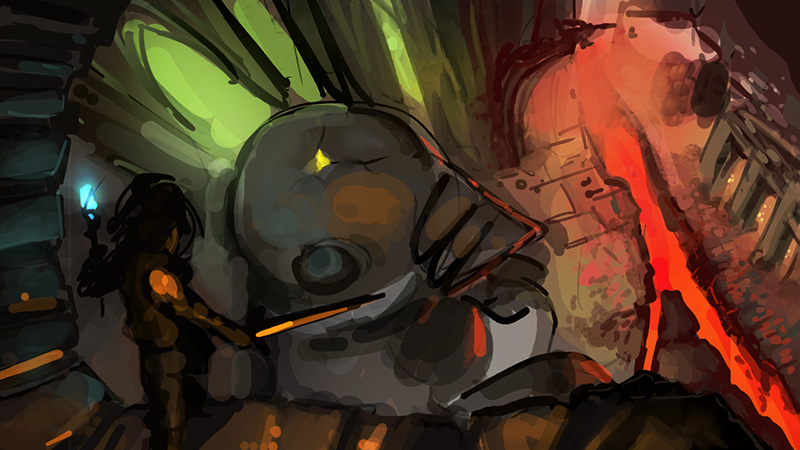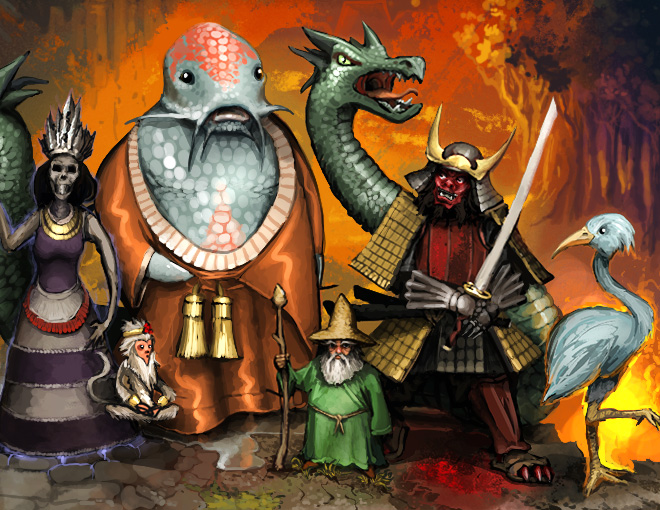Confessions of a Freelance Game Artist
I started this writing as a reflection upon how good it is, as a freelancer, for my artistic judgement to be trusted; how it is such a joy to be allowed to pour my passion into the work I do and use my artistic voice. I consider Starsector my prime example of this. Over five years ago I sent Alex a first set of sketches and asked for feedback: perhaps he wanted to go a different direction?, "just let me know", and so on. And he said no, this is great, do more of that. So I did, and kept doing. Perhaps our aesthetic taste, or vision, or something just happened to align. It's great fun working on Starsector.

Some of the first Starsector sprites I created.
But what's there to learn or teach from that? Everyone is happy, aren't we great. My thoughts turned to reflecting upon the freelance work I've done when everything didn't magically click and how each side of that deal – client and contractor – may have failed the project. Lucky me, when it comes to freelance art in game development, I've got plenty of experience both as client and contractor (and art director/manager on top of that), and have at various times failed in every role.
That's a fair definition of "experience", I think.

Unfinished art for a title screen for the first "Dungeons of Dredmor" expansion pack, "Realm of the Diggle Gods". I think the composition kinda rocks.
I've succeeded as well, don't get me wrong. It's obvious and lovely when that happens. But what's there to learn from easy success? I recall giving a talk on the development of Dungeons of Dredmor a few years ago that, in hindsight, was not particularly useful due to a lack of perspective. Maybe I was too high on success to look back and realize how much I paid for the mistakes we made. Back then, I didn't even realize they were mistakes. Why, I was young and excited to do this and staying up all night working on stuff seemed like a great idea!
Such is ever the attitude of kids trying to get into game development, isn't it?
In game development, and the tech industry generally, there is perhaps too much exaltation of those lucky success stories. Much of what the successful got was because they dodged failure unknowingly, like missing icebergs in the fog and thinking they were brilliant for it. There's not much to learn there, and worse, it ends up doing lot of misguided myth-building.
Perhaps if I tell you a bit about my mistakes you can avoid making them yourself. If someone had told me all this when I started I can only hope that I would have not been too stubborn or arrogant to listen. Hard to say.
So back to being trusted with my artistic vision: I have worked jobs where I was a technician fulfilling specifications laid out by the client. Brick-laying, basically. I do not resent this approach at all. I've got bills to pay, they’ve got money and they believe they know what they want. They're not drawing on my full potential so there may be missed opportunities, but a job is a job. I don't say this (just) to be egotistical - as an art director I believe that every artist has a real passion for certain things and if you can tap that then you're going to be in for an awesome ride. However an artist's passion does not always quite align with the needs of a project so both parties must find a way to do the work that is required well enough to fulfill its requirements. This is okay!
What feels terrible, I will confess, is when I am given trust and then I fail that trust.
I have delivered poor work as a freelancer before. It's a difficult position - you put hours into the work and discover you've hit the budget but the art simply isn't working. What then? Do you eat a bunch of unpaid time? - Of course one should never do this, and god it hurts when you have to make rent. Do you ask for more time and money? Cheeky - and it runs the risk of alienating the client.
I've been there. I recall a client who handled it beautifully. He said that he knew I could do better and asked me to step it up, and I did. It was almost like the benevolent reprimand of a good teacher. (Aside, I believe a good manager must share the qualities of a good teacher.)
I've also had a client who quietly dropped me because they didn't like my work. Hell, I didn't like my work either. It's awkward, and it's upsetting. And life goes on.
I've had a client where I simply couldn't deliver what they needed; I said I can't do this and refunded a payment. I've got mixed feelings about doing that now, but it was little enough at the time that it seemed worth my peace of mind.
I've even done the terrible freelance artist thing where I slowly fade away from a project and lose contact. (Please, never do this.)
I'm comforted, at least, that all of these experiences are many years behind me now and I can freely admit that I've been that crappy contractor. I was younger and more inexperienced, both at dealing with my own temperment and at handling lone freelance work in general. Scheduling oneself and managing ones own work-time / life-balance are real skills that must be developed. It is insufficient to simply 'just do it'; it is so easy to burn out, or to burn out your relationships with that misplaced work-machismo, or otherwise try to externalize the costs of working too hard for too little with the belief that if you just work harder and forever you'll be rewarded and be celebrated.
Remember: Someone always has to pay. It may not be now, it may not be you, but someone will pay.

Rough terrain. The very start of my widespread terrain tile assets.
So I've confessed. Let me try to give you something useful in exchange for suffering that.
I'll give this advice from the perspective of both the freelancer and the client. As stated, I've been in both positions.
Know your role and make decisions appropriately
The client - the party hiring the freelancer - is the owner of the project. They are the investor in the project or an agent acting on behalf of the investor. As an investor you are trading cash right now to a worker for their labour so that you may transform it into a product you own and which, presumably, you may profit from forever or dispose of however you wish. You're gambling your cash now for a greater profit or cause. There is risk here, but great potential reward.
The freelancer - the party being hired to do work - is generally not given a cut of the profits (and this is a huge discussion all its own, but long story short my baseline advice is that if you're accepting a cut of the profit, you’re accepting a percentage of zero which equals zero dollars). The point is, you're being paid to do labour. It is not your responsibility to ensure the project as a whole is scheduled or completed - that's called project management and it is the clients job. If they fail at that job, it’s up to them to take responsibility for it.
It sucks when a project fails its deadline or runs out of money, but remember that this is business and everyone must treat it as a business.
Start small
When starting a working relationship, start small. Break down the entirety of the job into pieces, and start with one small piece to test the working relationship. And when I say "test", remember that everyone is involved is running a business. Never work for free. Never insult professionals by asking them to work for free. (Actually this is done all the time, but it's terrible, and it's terrible to start a working relationship from an exploitative standpoint because if you're going to get screwed now, imagine how screwed you're going to be down the line when you're more invested. So don't even go there!)
Back to the project: Create a small agreement that states deliverables, schedule, and payments. Consider this a test run for your process where you make sure all the parts of the work go as expected and everyone can trust each other to go through the motions.
I'll give an example here:
Project: Draw one animated sprite character for $500.
Deposit payment: Artist gets paid $100 up-front, counted towards final fee. Artist then begins work.
Milestone 1: Artist creates design sketches, client provides up to 3 cycles of feedback and revision. Once approved, artist creates one draft walk cycle. $100 on delivery and approval.
Milestone 2: Artist creates all walkcycles, idle animations, and pickup animations. $100 on delivery and approval.
Milestone 3: Artist creates all ranged and melee attack animations and three variants of death animations. $200 on delivery and approval.
The worst case for the client here is if the artist simply disappears with $100. This is generally not in anyone's interest, because doing such a thing is awful for an artist's reputation - artists generally have some identity and standing in communities and social media, and it's extremely important to maintain a good, honest reputation.
The worst case for the artist is they do $100 of work to have the client disappear without paying anything more; if the artist took a deposit, then all is fair. If not, then they lost only 1/3rd of the project work-time.
Hopefully during the course of work on Milestone #1 each party got a feel for how it was to work with the other as they iterate over concept sketches. It's possible that there’s no rapport and either party can end the deal with as little damage to all concerned as possible.
Say it works out nicely though - great! You've built up trust in one another, and you're invested in one another - the artist in getting paid for future work, the client in having the artist create aesthetically consistent work for the rest of the project. Maybe do a set of three characters next for $1500. Keep stepping it up from there as is comfortable.
Use a contract
Seriously, there's no excuse not to. There's a web page that generates them for you: http://docontract.com/. It's so easy!
Depending on where you are you don't even really have to scan a signed contract so long as both parties agree in writing. You have no excuse!
In actual practice a contract will very rarely be taken to court. No one is going to go through all that bother for $100 or even $1000. The point of the contract is to clearly state expectations from each party, and that done, people generally behave and no one gets screwed. This isn't cold and inhuman, it's the basis for a sound working relationship. This is about business, remember? If you’re cutting the lawn for your parents, don't use a contract. If you're doing business with an adult, use a contract.
When you use a contract, as a freelancer, you will never have a client say "Oh, can you do this additional work for me?" without then expecting you to say "Sure! Let's come to an agreement on delivery schedule and compensation."
(The worst thing ever as a freelancer is scope creep. That is, you agree to do some work but the details keep changing and turning into more work. Don't fall victim to that - this is an example of the cost of project management errors being externalized onto the contractor. So if you're the client managing freelancers, it's your job as project manager to have room in your budget for unexpected additions.)

A terrain set that got rejected from the Unity Asset Store - it didn't have a working scene example. I should probably rework it one of these days, but the fundamental scheme is just slightly unsound.
If it isn't written down, it doesn't exist
If it isn't written down, it never happened. Anything important to the project must have a record created. If you discuss something in-person, via Skype or Hangouts, or on the phone, create a written record. Example:
Dear Freelancer,
As per our conversation via Skype today (2015 November 11), I'd like you to:
- tighten up the art on level 3
- make the wizard's hat red
- pixelate the voxels in the sketches of the giant toad's lair
Thanks,
- David Baumgart
Then if there are any misunderstandings in the future, you can refer to the email that both parties have in their inbox.
When things go wrong
Just as I've succeeded as a client and as a contractor, I've failed as a client and as a contractor.
Sometimes the art simply doesn't work, sometimes the relationship goes sour. All you can do in this situation is try to cut it off as cleanly as possible. Remember: this is business, you can be a professional even in failure. Yes, this will probably cost someone some money, but if you stage your agreement carefully it will hopefully cost as little as possible. Things to remember:
Always be professional. You will have an emotional reaction. You are human. The first thing you must remember is to tell yourself to 'shut up and think it over first'. Never send a communication or post to social media when your feelings are hot. Write down a draft of whatever you want to say, save it, then wait an hour - or a day. Now look back over your words and make sure you'd be comfortable if that was read by every future client, contractor, boss, employee, romantic partner, and heck, even your dear old grandma — because that's what can happen. Always be professional.
As a contractor, it is okay to be paid for failed work. If you performed the labour in good faith, the client chose to risk their investment on you. Part of their job is taking that risk, and that's the price they chose to pay. What they gain from taking on that risk is all the future profits from your labour which you will never see. That said, it is possible to compromise a little, but always remember that you deserve compensation for labour performed. This is business!
For bonus points as a contractor withdrawing from a deal, you can suggest a replacement for yourself. Maybe you know some artists that might be a better fit (or not; at least you're trying) - you can say "I don't think it's working out with me. I think artists X, Y, or Z might be better able to help you." Gracefully withdrawing from an agreement can be an investment in your reputation.
As a client working with freelancers, you are gambling the cost of a freelancers work on the future profits it may create. Sometimes you lose the gamble. Your job as project manager is to recognize when it is happening and minimize the damage done. You can politely and professionally tell a contractor that you would like to terminate the contract (as per the condition you included in the agreement, right?). You don't have to be nice, you don't have to be mean, you don't have to give any reason at all. You're allowed to just be a robot about it. Remember: this is business. I contracted a guy once who simply couldn't do the work well enough. I said - "Okay, please stop working. I will pay you what is owed. Thank you for your time."
Remember always, you're not a slave - you can terminate an agreement if you don't feel comfortable with it for any reason. And you don't have to give a reason. Again, this is business. You don't have to be nice, or mean, or tell anyone anything - you can simply stop work if you feel it's going to be a problem for any reason. It may be awkward, but it'll be more awkward if it involved messy emotions and drama.

A crop of some old Dominions 4 fanart by yours truly.
There are toxic people and unethical hucksters out there, or it may not be their fault; sometimes people just haven't figured their life out. All you can do is invest gradually into a working relationship to establish trust and rapport and be able to identify and withdraw cleanly when things go wrong - because you have a contract and a written understanding of what each party expects. Again with being professional: telling someone they're a bad person isn't going to fix them, or really make you feel better. You're not a priest, therapist, or judge (or maybe you are, but that's your day job!). You're just party to a business contract and that's all that's expected of you.
People want to do good work
After all of that doom and gloom, it is important to remember that people really do want to be helpful and do good work if they possibly can. It really comes down to maintaining both a constructive business relationship and a constructive human relationship by setting and meeting expectations through clear communication.
If everything works out, the freelancer gets paid while doing awesome work and the client can ship a great product and make lots of money. Then they can work together to do it all over again!
Return to blog index